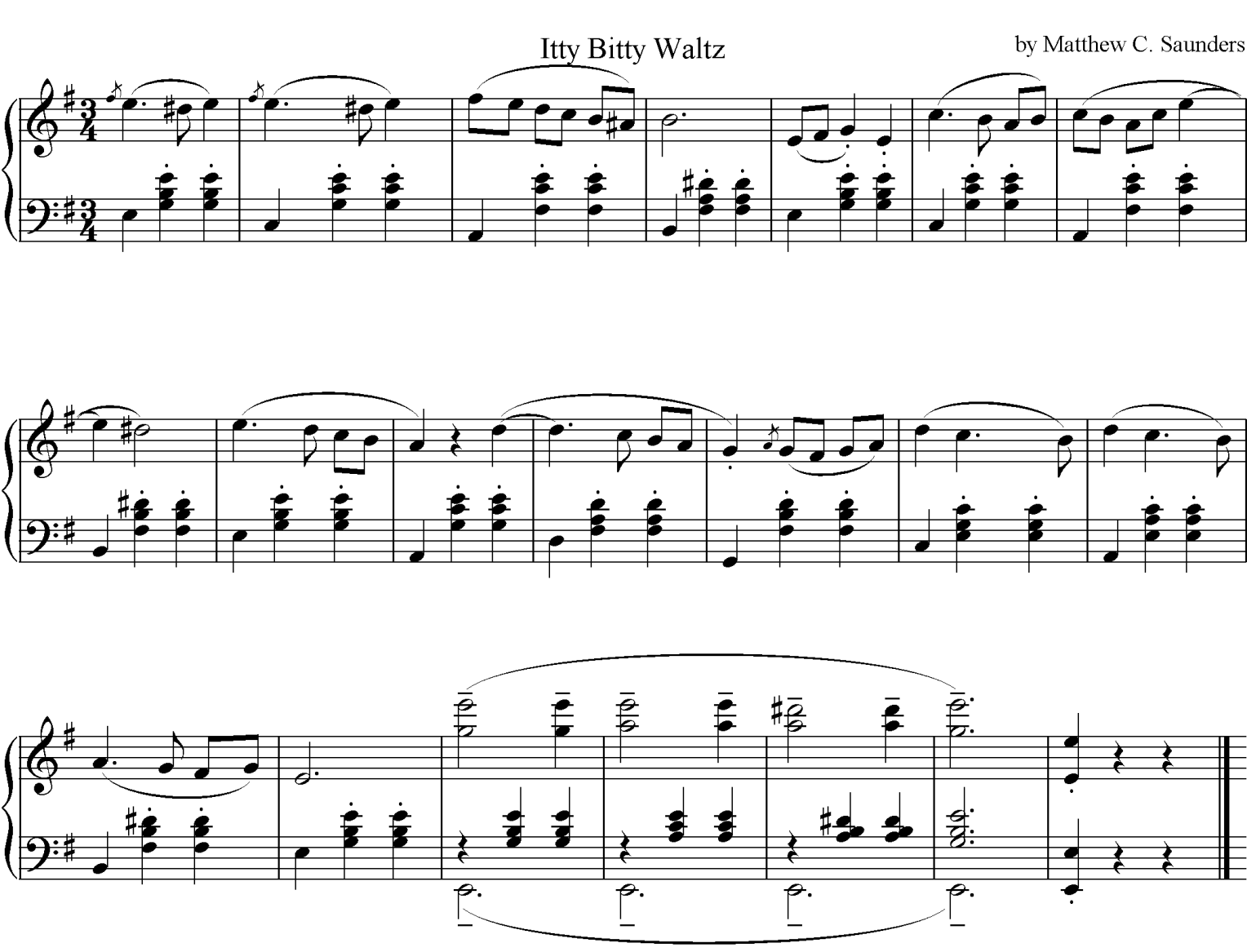I have a little series of little tonal pieces that I write for use in second and third semester theory. I got going on them because we don’t have a very large library here at OPSU, at least in the area of scores, and I needed pieces I could throw on the exam or midterm without worrying that students had seen them in piano class. In the end, it was just easier to write something new, and it has turned out to be more fun. It really gives me a chance stretch my chops a little bit and write in the style of Mozart or Chopin. Here’s the latest… it took about a half-hour to write from start to finish, and the point was to provide a piece that included a sequence and all the types of non-chord tones we studied this semester but that didn’t involve secondary functions and other third-semester stuff.
My wife enjoys these pieces greatly, because they sound pretty and they don’t last very long, so I always make sure to play them for her, just to let her know that I can write such things. The question has come up, now and then, as to why I don’t write such music all the time. I mean… it’s pleasant, it’s easy to listen to, it has the potential to be quite meaningful.
The problem isn’t this music–the problem is me. I could write lovely sonatinas and waltzes and scherzos and all the other wonderful music that Mozart and Schubert and Chopin gave us. I might even find the work rewarding. Over the last few years, I’ve discovered that melody isn’t really the challenge I once thought it was. I used to think, back in my high school days, that a great melody was the key to writing great music, and I had this inferiority complex about it, because I wasn’t just brimming with melodic inspiration. If I actually thought of a melody, I would rush to find staff paper to write it down–even getting out of bed in the middle of the night because I was afraid to lose it.
It’s not about melody, folks. It’s about harmony. Most melodies are fairly boring without their underlying harmony, and functional harmony has proved fascinating to our culture in a way that we are still trying to deal with.
Then there are the harmonic composers out there. Some of my composition students over the years have got some theory knowledge in them and are set to invent the next “Tristan” chord. “What do you think about this chord right here?” they say to me. “It’s a blah-bitty-blah-blah-blah with an F# in the bass… isn’t it amazing?” As I listen to them, all I can think is… it’s not about harmony either.
It’s about rhythm. I’m prepping to teach Music Fundamentals over the summer, and as I’m rereading Duckworth’s book, I notice that he agonizes over a definition for rhythm. I still like the definition I used to use when I taught sixth-grade general music–rhythm is “the interaction of musical events with the basic pulse.” I’d like to know what Duckworth thinks about that.
I’ve long viewed myself as basically a rhythmic composer, feeling that the other musical elements follow. A piece that works, to me, works first on a rhythmic level, not melodic or harmonic, and I rarely encounter problems with a composition that can’t be solved rhythmically. For me, rhythm is what makes a piece work.
Which is why I can’t write functional harmony and consider it to be my authentic voice. I need harmony to be subservient to rhythm, not at best an equal partner as it is in Chopin or Mozart. I don’t know if it is my training as a bandsman, by immersion in popular styles like jazz and rock for so many years or just the way music seems to work to me. I enjoy music with shifting meters, metric modulation, syncopation, assymetrical meters and all the rest. I don’t reject harmony completely, but I can’t carry on writing I-IV-V-I and thinking that I’m doing something authentic–I would always be channeling some other composer, and usually doing it badly. I think of one of my favorite songwriters, Billy Joel, who wrote a set of Fantasies and Delusions in a more or less classical styles. Nice, entertaining little pieces, but not as good as their models.
That said, I’m glad that I can write my Itty Bitty pieces, or a jazz tune, or arrange horn parts for a rock band. That stuff is just as important to what I do, as it turns out. We live in this world of tonal, often functional music. When I compose, it isn’t meant to be background for shopping at the Gap–it’s meant to be something people sit quietly and contemplate. It’s meant to help me reach out to the rest of humanity, first through collaboration with other musicians and artists, and then by speaking to an audience.
